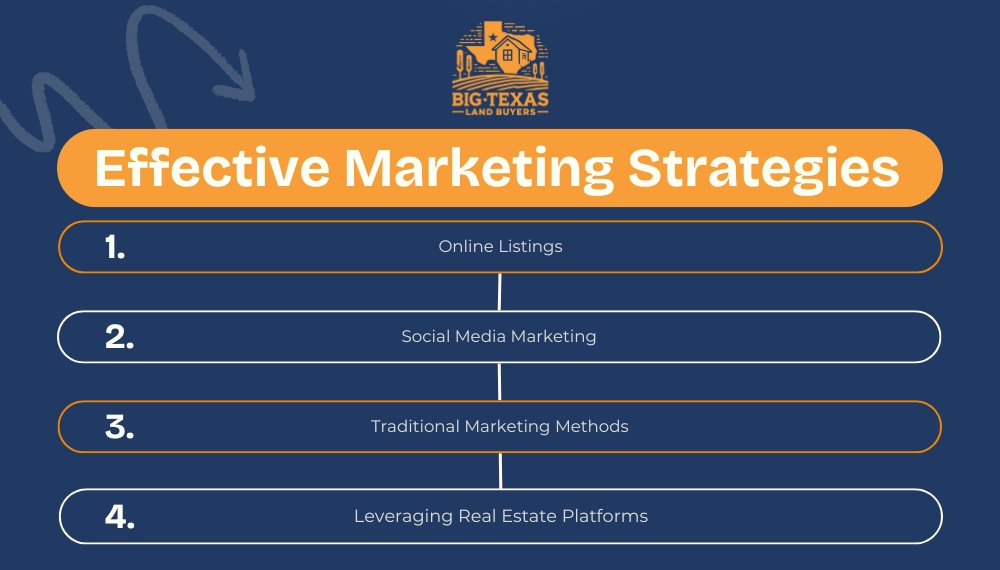Selling land in Texas can be a lucrative endeavor, but it requires a well-planned marketing strategy to ensure a quick and profitable sale. This article will explore various Marketing Strategies for Selling Land in Texas to help you effectively sell your land, from understanding the market to negotiating the final deal.
Understanding the Texas Land Market

Current Market Trends
The Texas land market is dynamic and influenced by various factors, including economic conditions, population growth, and regional development projects. Understanding these trends is crucial for setting realistic expectations and pricing your land competitively.
Types of Land in Texas
Texas offers diverse land types, including agricultural, residential, commercial, and recreational properties. Identifying the type of land you are selling will help tailor your marketing strategy to attract the right buyers.
Factors Influencing Land Value
Several factors affect land value in Texas, including location, size, topography, soil quality, and access to utilities. Conducting a thorough evaluation of these factors will help you determine a fair price and highlight the land’s strengths in your marketing materials.
Preparing for Selling Land in Texas

Legal Considerations and Documentation
Before listing your land for sale, ensure all legal documents are in order, including the deed, title insurance, and any necessary permits. Consult with a real estate attorney to address any legal issues that may arise during the sale process.
Improving Land Appeal
Enhance the appeal of your land by clearing debris, maintaining access roads, and showcasing any unique features such as water bodies or scenic views. Consider hiring a professional to conduct a land survey and create an attractive site map for potential buyers.
Environmental and Zoning Regulations
Familiarize yourself with local zoning laws and environmental regulations that may impact the sale of your land. Ensure compliance with these regulations to avoid any legal complications and provide buyers with confidence in their purchase.
Setting the Right Price

Market Analysis
Conduct a comprehensive market analysis to understand the current land prices in your area. This will help you set a competitive price that attracts buyers while ensuring you get a fair return on your investment.
Comparative Market Analysis (CMA)
A Comparative Market Analysis (CMA) involves comparing your land with similar properties that have recently sold in the area. This analysis provides valuable insights into pricing trends and helps you position your land competitively in the market.
Working with Appraisers
Hiring a professional appraiser can provide an accurate valuation of your land based on its unique characteristics and market conditions. An appraisal report can also serve as a valuable tool during negotiations with potential buyers.
Effective Marketing Strategies

Online Listings
Importance of High-Quality Photos and Videos
High-quality photos and videos are essential for online listings as they create a strong first impression and attract more interest. Consider hiring a professional photographer to capture your land’s best features.
Best Websites for Land Listings
List your land on popular real estate websites such as Zillow, Realtor.com, and LandWatch. These platforms have a broad audience and can significantly increase the visibility of your property.
SEO for Property Listings
Optimize your online listings with relevant keywords, including “selling land in Texas,” to improve search engine rankings. This will help potential buyers find your property more easily when searching for land in Texas.
Social Media Marketing
Using Facebook, Instagram, and Twitter
Social media platforms are powerful tools for reaching a broad audience. Share engaging posts about your land, including photos, videos, and interesting facts. Use targeted ads to reach potential buyers in specific locations or demographics.
Targeted Ads
Invest in targeted advertising on social media platforms to reach potential buyers who are actively looking for land in Texas. Utilize the platforms’ demographic and geographic targeting features to narrow down your audience.
Engaging Content Ideas
Create content that highlights the unique features of your land, such as stunning views, fertile soil, or proximity to amenities. Share stories about the history of the land or its potential uses to spark interest and engagement.
Traditional Marketing Methods
Signage and Flyers
Place attractive signs on the property and distribute flyers in local communities to increase visibility. Ensure that the signage is clear, professional, and includes essential contact information.
Local Newspapers and Magazines
Advertise your land in local newspapers and magazines to reach potential buyers who may not be active online. This traditional approach can be particularly effective in rural areas where print media remains popular.
Networking with Real Estate Agents
Collaborate with local real estate agents who have experience selling land in Texas. They can provide valuable insights, connect you with potential buyers, and help market your property through their networks.
Leveraging Real Estate Platforms
Working with Land Brokers
Land brokers specialize in selling large parcels of land and can offer targeted marketing strategies to attract buyers. Partnering with a reputable broker can streamline the selling process and increase your chances of a quick sale.
Utilizing Multiple Listing Services (MLS)
Listing your property on the Multiple Listing Service (MLS) can significantly increase its exposure to real estate agents and potential buyers. Ensure your listing includes detailed information and high-quality images to stand out.
Real Estate Auctions
Consider selling your land through a real estate auction to generate interest and create a sense of urgency among buyers. Auctions can be an effective way to sell land quickly, especially if the property has unique or desirable features.
Open Houses and Land Tours
Planning and Hosting Events
Organize open houses and land tours to showcase your property to potential buyers. Provide guided tours that highlight the land’s best features and answer any questions buyers may have.
Virtual Tours and Open Houses
Incorporate virtual tours and online open houses to reach a wider audience, including out-of-state buyers. Use high-quality video and interactive features to provide an immersive experience.
Safety and Accessibility Considerations
Ensure the safety and accessibility of your land during tours by clearing pathways and providing clear signage. Consider accessibility needs to accommodate all potential buyers.
Negotiation and Closing the Deal
Effective Communication Skills
Develop strong communication skills to build rapport with potential buyers and address their concerns. Be transparent and responsive to foster trust and facilitate a smooth negotiation process.
Understanding Buyer Psychology
Understand the motivations and concerns of potential buyers to tailor your negotiation strategy. Highlight the benefits and unique features of your land to address their needs and preferences.
Legal and Financial Steps in Closing
Work with a real estate attorney and financial advisor to navigate the legal and financial aspects of closing the deal. Ensure all necessary documents are in order and guide buyers through the closing process.
Post-Sale Considerations
Handling Paperwork
Complete all necessary paperwork, including transferring the deed and updating tax records. Ensure both parties have copies of all relevant documents for future reference.
Paying Taxes and Fees
Calculate and pay any applicable taxes and fees associated with the sale. Consult with a tax professional to understand your obligations and avoid any legal issues.
Ensuring Smooth Transition for Buyers
Provide buyers with any essential information about the land, such as maintenance tips, contact information for local services, and any existing warranties or guarantees.
Case Studies and Success Stories
Examples of Successfully Sold Properties
Share case studies and success stories of properties that were sold quickly using effective marketing strategies. Highlight the challenges faced and the solutions implemented to inspire and guide other sellers.
Lessons Learned from Successful Sales
Discuss the key takeaways and lessons learned from successful land sales. Provide actionable tips and best practices to help other landowners achieve similar results.
Marketing Strategies for Selling Land in Texas Quickly
Utilizing Technology and Innovation
Leveraging modern technology and innovative tools can significantly enhance your marketing strategy for selling land in Texas. Here’s how you can incorporate these advancements to attract potential buyers and facilitate a quick sale:
Drone Photography and Videography: Drones provide an aerial perspective that showcases the entire property and its surroundings. High-quality drone footage can highlight the land’s features, boundaries, and nearby amenities, making it more appealing to buyers. Invest in professional drone services to create compelling visual content for your listings and marketing materials.
Virtual Reality (VR) Tours: Virtual reality tours offer an immersive experience, allowing potential buyers to explore the property from the comfort of their homes. VR tours can be particularly beneficial for out-of-state or international buyers who cannot visit the land in person. Use VR technology to create interactive tours that highlight key features and provide a realistic sense of the property’s layout and environment.
3D Mapping and Modeling: 3D mapping and modeling tools can create detailed, interactive maps of your land. These tools can showcase elevation changes, terrain types, and potential development opportunities. Incorporate 3D maps into your online listings and presentations to give buyers a comprehensive understanding of the property.
Geolocation Targeting: Use geolocation targeting in your online advertising campaigns to reach potential buyers in specific regions or areas of interest. Geolocation targeting allows you to tailor your ads to people who are most likely to be interested in buying land in Texas, increasing the efficiency and effectiveness of your marketing efforts.
Digital Marketing Analytics: Utilize digital marketing analytics tools to track the performance of your online campaigns. Analyzing metrics such as click-through rates, engagement, and conversion rates can help you refine your strategies and focus on the most effective channels. Adjust your marketing efforts based on data insights to maximize reach and attract serious buyers.
Conclusion
Selling land in Texas quickly requires a well-planned and executed marketing strategy. By understanding the market, preparing your land, setting the right price, and utilizing both online and traditional marketing methods, you can attract the right buyers and close the deal efficiently. Stay informed, be proactive, and leverage all available resources to achieve a successful sale.

